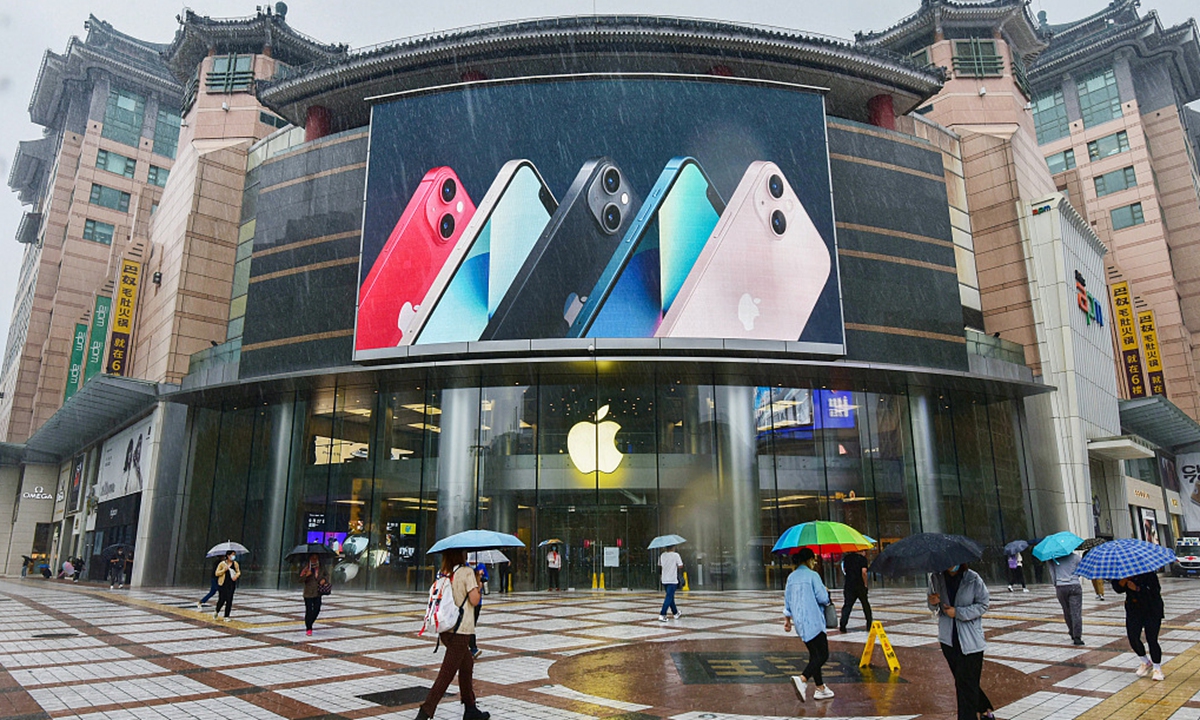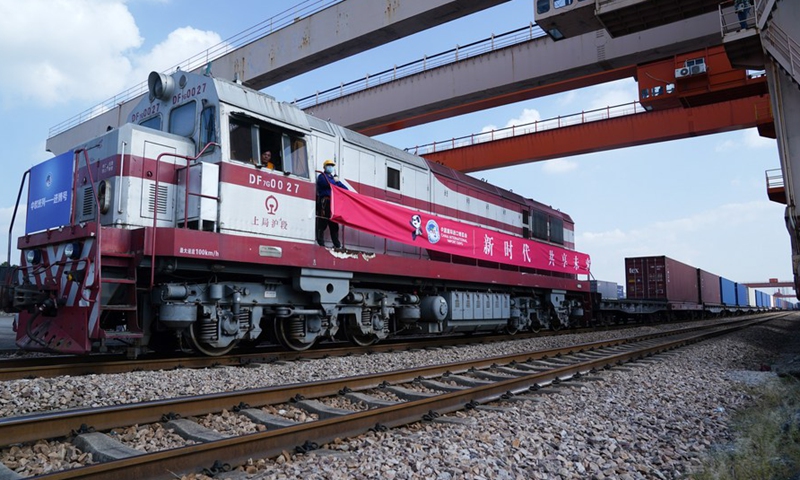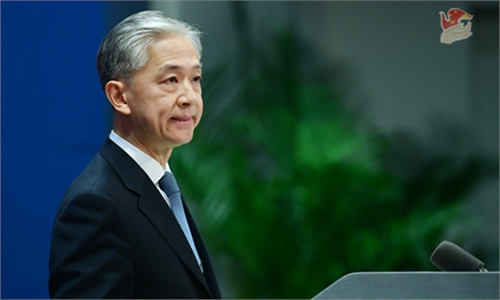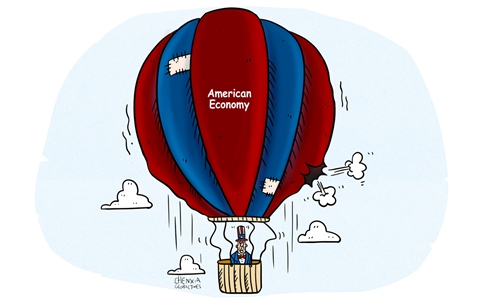Quarterly data, strong enthusiasm for CIIE highlight US biz’s growing reliance on China market

On September 24, 2021, people walk past an apple store in Wangfujing, Beijing, with iPhone 13 series advertisement on a big screen. Photo: CFP
Newly released quarterly sales data for a number of US companies - from Apple to Starbucks to Coca-Cola - shows an increasing reliance of US corporations on the vast and growing Chinese market. This, together with US' sluggish economic growth in the same quarter, underlined the importance of China-US economic and trade cooperation.
Chinese analysts pointed out that the strong performance by US companies in China serves as a reminder of the unique importance of the China-US trade and economic cooperation to the Biden administration, which has largely kept a Trump-era trade and economic policy of imposing additional tariffs on Chinese goods and sanctioning Chinese companies despite easing signs that the world's two largest economies are ramping up trade talks over the past month.
Amid slowing US economic growth, the US should realize that it occupies no position of strength and should create more favorable conditions conducive to restarting China-US trade and economic cooperation against the backdrop of more frequent high-level exchanges in recent months, they noted.
Despite stimulus measures, the US economy grew only at 2 percent in the third quarter in the wake of a Delta surge, US official data showed on Thursday. The growth shrank sharply from 6.7 percent in the second quarter, and US citizens are facing empty shelves for the Christmas season due to the paralyzed supply chain and logistics.
However, a number of leading US companies have posted strong China gains for the quarter as the Chinese market showed a "predictable" business environment for foreign capital with the country's effective control of the pandemic, Chinese analysts said.
Apple's sales in China in the fourth quarter that ended in September increased 83 percent year-on-year to $14.56 billion, according to the company's financial report on Thursday (US time). The growth in China was higher than the 19.9 percent increase in the American market and 23 percent growth in Europe.
Starbucks, which has China as its second largest market in terms of store portfolio, saw its overall sales revenues in China increase 18 percent in the quarter ending on October 3 to $964 million.
The number of stores increased by 14 percent to 5,360 in the Chinese market while its US store expansion remained flat at 1 percent.

A man works at a production line of the Swire Coca-Cola Beverages Hubei Limited in Wuhan, central China's Hubei Province, March 24, 2020.Photo:Xinhua
Coca-Cola posted a 16 percent increase in its third quarter revenues on Wednesday, to $10.04 billion. The company said that the quarterly growth in its Asia-Pacific unit was driven by India and China, catching up to pre-virus levels.
Two of its bottling partners signed a deal to build a new plant in North China's Shanxi Province to meet the growing demand.
The strong China earnings by US companies came as more frequent dialogues between high-ranking officials between the two countries in recent months and US companies' unchanged passion in their participation at the 4th China International Import Expo (CIIE).
"Countries including the US, Japan and Germany that have fielded a heavy presence in previous expos continued to participate in the CIIE with the same vigor, with the overall number of participating companies and display floor space remaining unchanged or showing an increase," Sun Chenghai, deputy director of the CIIE bureau, said during a press conference on Thursday.
At the 3rd CIIE last year, US companies occupied the largest floor space.
Tesla, which produced 238,000 vehicles in the third quarter and described China as "main export hub in the quarter" in its quarterly report amid global supply chain and logistics challenges, said it is moving its Shanghai giga-factory into the CIIE site to showcase its manufacturing knowhow and latest fruits in localization.
US Trade Representative Katherine Tai said on Thursday (US time) at a meeting of the US National Chicken Council that her engagement with China is aimed at reducing the temperature of a trade relationship between the world's two largest economies that has become dangerously heated, Reuters reported.
The US Department of Agriculture forecasts that American chicken meat exports to China will grow by 3 percent in 2022 to 930,000 tons as Chinese consumers eat more meat.
Tai's comments followed two trade talks between Chinese and US senior officials in October, with Chinese Vice Premier Liu He, who is also chief of the Chinese side of the China-US comprehensive economic dialogue, talking with US Treasury Secretary Janet Yellen on Tuesday. Tai held talks with Liu on October 9.

Photo taken on Oct. 29, 2021 shows the first China-Europe freight train carrying CIIE exhibits arrived in Shanghai.Photo:Xinhua
US needs to be pragmatic, constructive
Analysts pointed out that as China and the US face a long list of thorny issues, including the US' punitive tariffs on Chinese goods, its sanctions against Chinese firms and Taiwan-related affairs, the US should remove multiple obstacles and restrictions on Chinese enterprises so that mutually beneficial trade and economic ties could better play a stabilizing role in the bilateral relationship.
US companies' increasing reliance on the Chinese market also forces some US politicians to adopt a more pragmatic view toward China-US trade and economic relations.
"Even if China-bashing is politically correct in the US, US officials have to learn to be more practical in viewing China-US trade and economic relations," said Li Yong, deputy chairman of the Expert Committee of the China Association of International Trade, a think tank affiliated with the Chinese Ministry of Commerce.
"Because if they don't, the already difficult American economy will become even more difficult," Li said, noting that ignoring this fact will in the end hurt these politicians.
Qin Gang, Chinese Ambassador to the US, noted at the 2021 annual gala of the China General Chamber of Commerce-Chicago on Tuesday (US time) that economic and trade cooperation has always been the ballast and propeller of China-US relations, and should become a lubricant and stabilizer as bilateral relations undergo a new round of adjustments.
On Thursday, the US Senate voted unanimously to approve legislation that bans at least five Chinese telecom companies from receiving new equipment licenses from US regulators. Companies like Huawei, ZTE and Hytera Communications are affected.
The move came after the Federal Communications Commission on Tuesday voted to revoke authorization for China Telecom's US branch to continue operations, citing national security concerns.
While US companies make money in China and Chinese companies in the US are purged to the brink of extinction, Chinese analysts urged US politicians to remove roadblocks that prevent China-US trade and economic ties from better performing its roles as the ballast of bilateral ties.
Yu Miaojie, deputy dean of the National School of Development at Peking University, told the Global Times that scrapping the high tariff duties on $370 billion worth of Chinese goods will provide a lift to the battered US economy.
"It requires the Biden administration to walk out of the Trump mindset. It would do good to the Chinese economy as well," Yu said.



